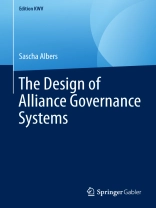Strategic alliances have emerged as an important element of firms’ strategies. Following suit, research on alliances has blossomed, concentrating on the various forms alliances take, the reasons of their existence, and increasingly embracing questions of alliance management and governance tasks. However, most contributions which address the alliance governance problem are yet rather vague and selective in their conception of alliance governance structures as well as the factors which influence their suitability. The aim of this book is to further advance our understanding of alliance governance and to provide recommendations on the problem of alliance governance design. Following the configurational approach, Sascha Albers develops a comprehensive model of alliance governance systems. He identifies relevant structural and instrumental design parameters and analyzes major contingency factors, including member firms’ cultures and alliance experience, number of alliance partners, and trust, which impact the design parameters’ suitability. He finally deducts five configurations, or ideal types, of alliance governance systems which can be regarded as blueprints for the practitioner and as platform for further research for the alliance scholar.
Potential readership includes scholars of strategic management and organization theory, interested students in these areas as well as practitioners involved in formulating and implementing alliance strategies.
Tabela de Conteúdo
A. Introduction.- B. Considering Cooperation and Alliances.- C. The Governance of Collective Action: On Governance Systems.- D. A Framework for the Design of Alliance Governance Systems.- E. Contingency Factors of Alliance Governance Systems.- F. Configurations of Alliance Governance Systems.- G. Conclusions.
Sobre o autor
Sascha Albers is Professor of International Management at the University of Antwerp. He received his Ph D from the University of Cologne, where he is still a research fellow. He has been a visiting scholar and invited presenter at universities and business schools in Europe, the US and Oceania. His publications appeared in such journals as Journal of Management, Harvard Business Manager, and European Management Journal. His current research focuses on management problems arising from the interplay of competitive and cooperative structures.












